LM 2_4 The Principle of Inertia Collection
2.4 The principle of inertia by Benjamin Crowell, Light and Matter licensed under the Creative Commons Attribution-ShareAlike license.
2.4 The principle of inertia
Physical effects relate only to a change in velocity
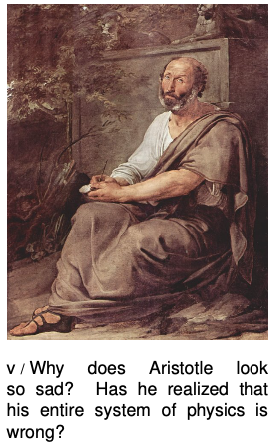 Consider two statements of a kind that was at one time made with the utmost seriousness:
Consider two statements of a kind that was at one time made with the utmost seriousness:
People like Galileo and Copernicus who say the earth is rotating must be crazy. We know the earth can't be moving. Why, if the earth was really turning once every day, then our whole city would have to be moving hundreds of leagues in an hour. That's impossible! Buildings would shake on their foundations. Gale-force winds would knock us over. Trees would fall down. The Mediterranean would come sweeping across 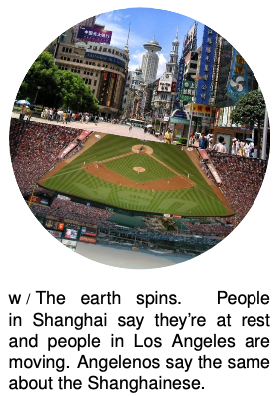 the east coasts of Spain and Italy. And furthermore, what force would be making the world turn?
the east coasts of Spain and Italy. And furthermore, what force would be making the world turn?
All this talk of passenger trains moving at forty miles an hour is sheer hogwash! At that speed, the air in a passenger compartment would all be forced against the back wall. People in the front of the car would suffocate, and people at the back would die because in such concentrated air, they wouldn't be able to expel a breath.
Some of the effects predicted in the first quote are clearly just based on a lack of experience with rapid motion that is smooth and free of vibration. But there is a deeper principle involved. In each case, the speaker is assuming that the mere fact of motion must have dramatic physical effects. More subtly, they also believe that a force is needed to keep an object in motion: the first person thinks a force would be needed to maintain the earth's rotation, and the second apparently thinks of the rear wall as pushing on the air to keep it moving.
 Common modern knowledge and experience tell us that these people's predictions must have somehow been based on incorrect reasoning, but it is not immediately obvious where the fundamental flaw lies. It's one of those things a four-year-old could infuriate you by demanding a clear explanation of. One way of getting at the fundamental principle involved is to consider how the modern concept of the universe differs from the popular conception at the time of the Italian Renaissance. To us, the word “earth” implies a planet, one of the nine planets of our solar system, a small ball of rock and dirt that is of no significance to anyone in the universe except for members of our species, who happen to live on it. To Galileo's contemporaries, however, the earth was the biggest, most solid, most important thing in all of creation, not to be compared with the wandering lights in the sky known as planets. To us, the earth is just another object, and when we talk loosely about “how fast” an object such as a car “is going,” we really mean the car-object's velocity relative to the earth-object.
Common modern knowledge and experience tell us that these people's predictions must have somehow been based on incorrect reasoning, but it is not immediately obvious where the fundamental flaw lies. It's one of those things a four-year-old could infuriate you by demanding a clear explanation of. One way of getting at the fundamental principle involved is to consider how the modern concept of the universe differs from the popular conception at the time of the Italian Renaissance. To us, the word “earth” implies a planet, one of the nine planets of our solar system, a small ball of rock and dirt that is of no significance to anyone in the universe except for members of our species, who happen to live on it. To Galileo's contemporaries, however, the earth was the biggest, most solid, most important thing in all of creation, not to be compared with the wandering lights in the sky known as planets. To us, the earth is just another object, and when we talk loosely about “how fast” an object such as a car “is going,” we really mean the car-object's velocity relative to the earth-object.
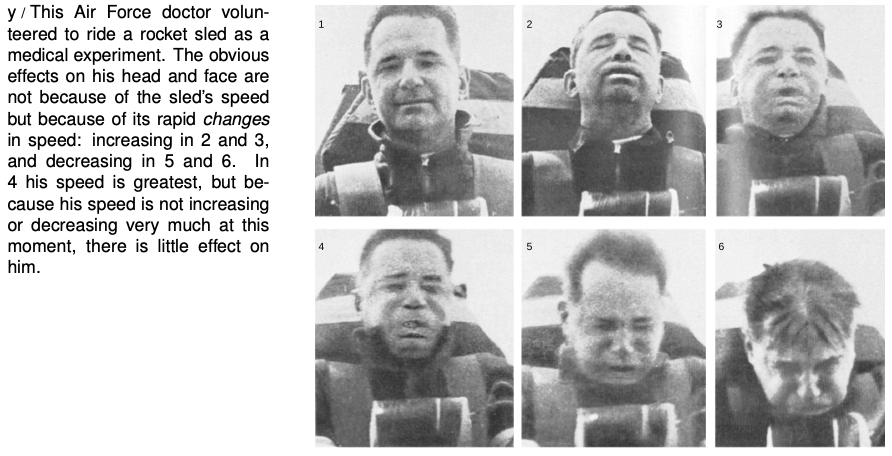
Motion is relative
According to our modern world-view, it isn't reasonable to expect that a special force should be required to make the air in the train have a certain velocity relative to our planet. After all, the “moving” air in the “moving” train might just happen to have zero velocity relative to some other planet we don't even know about. Aristotle claimed that things “naturally” wanted to be at rest, lying on the surface of the earth. But experiment after experiment has shown that there is really nothing so special about being at rest relative to the earth. For instance, if a mattress falls out of the back of a truck on the freeway, the reason it rapidly comes to rest with respect to the planet is simply because of friction forces exerted by the asphalt, which happens to be attached to the planet.
Galileo's insights are summarized as follows:
The principle of inertia

No force is required to maintain motion with constant velocity in a straight line, and absolute motion does not cause any observable physical effects.
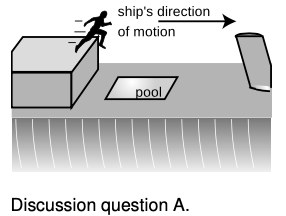 There are many examples of situations that seem to disprove the principle of inertia, but these all result from forgetting that friction is a force. For instance, it seems that a force is needed to keep a sailboat in motion. If the wind stops, the sailboat stops too. But the wind's force is not the only force on the boat; there is also a frictional force from the water. If the sailboat is cruising and the wind suddenly disappears, the backward frictional force still exists, and since it is no longer being counteracted by the wind's forward force, the boat stops. To disprove the principle of inertia, we would have to find an example where a moving object slowed down even though no forces whatsoever were acting on it. Over the years since Galileo's lifetime, physicists have done more and more precise experiments to search for such a counterexample, but the results have always been negative. Three such tests are described on pp. 114, 243, and 271.
There are many examples of situations that seem to disprove the principle of inertia, but these all result from forgetting that friction is a force. For instance, it seems that a force is needed to keep a sailboat in motion. If the wind stops, the sailboat stops too. But the wind's force is not the only force on the boat; there is also a frictional force from the water. If the sailboat is cruising and the wind suddenly disappears, the backward frictional force still exists, and since it is no longer being counteracted by the wind's forward force, the boat stops. To disprove the principle of inertia, we would have to find an example where a moving object slowed down even though no forces whatsoever were acting on it. Over the years since Galileo's lifetime, physicists have done more and more precise experiments to search for such a counterexample, but the results have always been negative. Three such tests are described on pp. 114, 243, and 271.
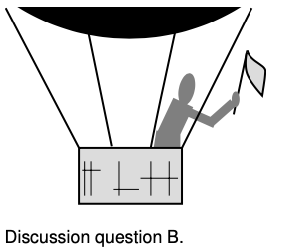 self-check:
self-check:
What is incorrect about the following supposed counterexamples to the principle of inertia?
(1) When astronauts blast off in a rocket, their huge velocity does cause a physical effect on their bodies --- they get pressed back into their seats, the flesh on their faces gets distorted, and they have a hard time lifting their arms.
(2) When you're driving in a convertible with the top down, the wind in your face is an observable physical effect of your absolute motion.
(answer in the back of the PDF version of the book)
⇒ Solved problem: a bug on a wheel problem 7
Discussion Questions
A A passenger on a cruise ship finds, while the ship is docked, that he can leap off of the upper deck and just barely make it into the pool on the lower deck. If the ship leaves dock and is cruising rapidly, will this adrenaline junkie still be able to make it?
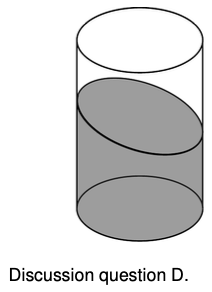 B You are a passenger in the open basket hanging under a helium balloon. The balloon is being carried along by the wind at a constant velocity. If you are holding a flag in your hand, will the flag wave? If so, which way? [Based on a question from PSSC Physics.]
B You are a passenger in the open basket hanging under a helium balloon. The balloon is being carried along by the wind at a constant velocity. If you are holding a flag in your hand, will the flag wave? If so, which way? [Based on a question from PSSC Physics.]
C Aristotle stated that all objects naturally wanted to come to rest, with the unspoken implication that “rest” would be interpreted relative to the surface of the earth. Suppose we go back in time and transport Aristotle to the moon. Aristotle knew, as we do, that the moon circles the earth; he said it didn't fall down because, like everything else in the heavens, it was made out of some special substance whose “natural” behavior was to go in circles around the earth. We land, put him in a space suit, and kick him out the door. What would he expect his fate to be in this situation? If intelligent creatures inhabited the moon, and one of them independently came up with the equivalent of Aristotelian physics, what would they think about objects coming to rest?
D The glass is sitting on a level table in a train's dining car, but the surface of the water is tilted. What can you infer about the motion of the train?
2.4 The principle of inertia by Benjamin Crowell, Light and Matter licensed under the Creative Commons Attribution-ShareAlike license.
Calculators and Collections
- Comments
- Attachments
- Stats
No comments |
